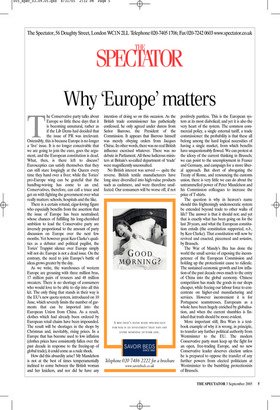Why ‘Europe’ matters
The Conservative party talks about Europe so little these days that it is becoming unnatural, rather as if the Lib Dems had decided that the issue of PR was irrelevant. Ostensibly, this is because Europe is no longer a ‘live’ issue. It is no longer conceivable that we are going to join the euro, goes the argument, and the European constitution is dead. What, then, is there left to discuss? Eurosceptics can satisfy themselves that they can still stare longingly at the Queen every time they hand over a fiver; while the Tories’ pro-Europe wing can be grateful that the handbag-waving has come to an end. Conservatives, therefore, can call a truce and get on with fighting the government over what really matters: schools, hospitals and the like.
There is a certain rotund, cigar-loving figure who especially benefits from the assertion that the issue of Europe has been neutralised; whose chances of fulfilling his long-cherished ambition to lead the Conservative party are inversely proportional to the amount of party discussion on Europe over the next few months. Yet however great Ken Clarke’s qualities as a debater and political pugilist, the Tories’ Trappist silence over Europe simply will not do. Europe is not a dead issue. On the contrary, the need to join Europe’s battle of ideas grows greater by the day.
As we write, the warehouses of western Europe are groaning with three million bras, 17 million pairs of trousers and 48 million sweaters. There is no shortage of consumers who would love to be able to slip into all this kit. The only thing that stands in their way is the EU’s new quota system, introduced on 10 June, which severely limits the number of garments that can be imported into the European Union from China. As a result, clothes which had already been ordered by European retail chains have been impounded. The result will be shortages in the shops by Christmas and, inevitably, rising prices. In a Europe that has become used to low inflation (clothes prices have consistently fallen over the past decade in response to the freeing-up of global trade), it could come as a rude shock.
How did this absurdity arise? Mr Mandelson is not at the best of times temperamentally inclined to come between the British woman and her knickers, and nor did he have any intention of doing so on this occasion. As the British trade commissioner has pathetically confessed, he only agreed under duress from Señor Barroso, the President of the Commission. It appears that Barroso himself was merely obeying orders from Jacques Chirac. In other words, there was no real British influence exercised whatever. There was no debate in Parliament. All those ludicrous ministers at Britain’s so-called department of ‘trade’ were magnificently unconsulted.
No British interest was served — quite the reverse. British textile manufacturers have long since diversified into high-value products such as cashmere, and were therefore unaffected. Our consumers will be worse off, if not positively pantless. This is the European system at its most diabolical; and yet it is also the very heart of the system. The common commercial policy, a single external tariff, a trade commissioner: the probability is that these all belong among the hard logical necessities of having a single market, from which benefits have unquestionably flowed. We can protest at the idiocy of the current thinking in Brussels; we can point to the unemployment in France and Germany, and campaign for a more liberal approach. But short of abrogating the Treaty of Rome, and renouncing the customs union, there is very little we can do about the untrammelled power of Peter Mandelson and his Commission colleagues to increase the price of T-shirts.
The question is why in heaven’s name should this frighteningly undemocratic system be extended beyond trade to other walks of life? The answer is that it should not; and yet that is exactly what has been going on for the last 20 years, and what the European constitution entails (the constitution supported, n.b., by Ken Clarke). That constitution will now be revived and enacted, piecemeal and seriatim, by Brussels.
The War of Mandy’s Bra has done the world the small service of exposing the incompetence of the European Commission and holding up the protectionist cause to ridicule. The sustained economic growth and low inflation of the past decade owes much to the entry of China into the global economy. Chinese competition has made the goods in our shops cheaper, while freeing our labour force to concentrate on higher-end manufacturing and services. However inconvenient it is for Portuguese seamstresses, Europeans as a whole have been hugely enriched by globalisation, and when the current shambles is finished that truth should be more evident.
More important still, Bra Wars is a textbook example of why it is wrong, in principle, to transfer any further political authority from Westminster to the EU. The modern Conservative party must keep up the fight for an open, free-trading Europe, and no new Conservative leader deserves election unless he is prepared to oppose the transfer of any further powers from elected politicians at Westminster to the bumbling protectionists of Brussels.









































 Previous page
Previous page